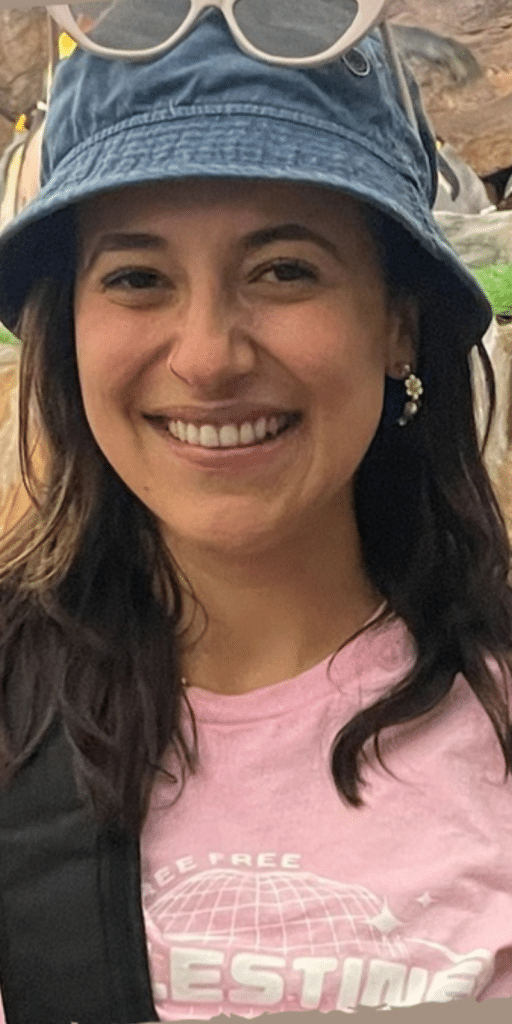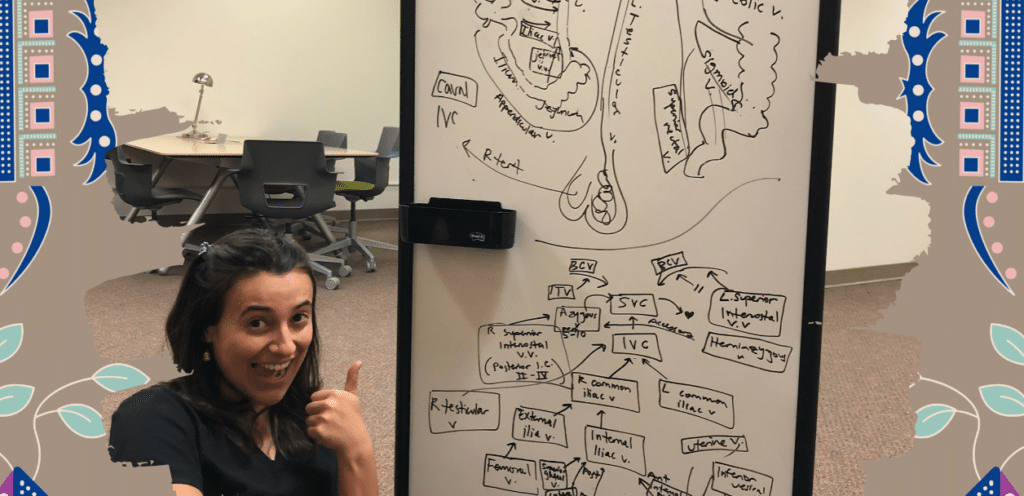
Sofia “Soap” Ramirez immigrated back to the United States from Guatemala as a child. Transitioning to a new culture and language was naturally challenging, as was her inability to answer the constant question: where do you go to church?
Once she began openly identifying as an atheist at 13 she was bulled, and her loneliness grew. In search of a community, she convinced her reluctant parents to let her attend Camp Quest Kansas City. Now, more than a decade later, you can find Soap volunteering at both CQKC and CQNW. She is a beloved counselor, leader of songs, and bringer of campy energy, spontaneous silliness, and joy.
Soap is also one of only a few people of color currently active in the Camp Quest community. We are so grateful for the time Soap spent sharing her journey and insights.
MOVING TO A NEW COUNTRY AND FINDING A NEW COMMUNITY
I first heard about Camp Quest from my mom when I was ten. I thought it sounded like a lot of fun but my mom said she wouldn’t actually send me (it’s funny to look back on this memory now) and I still considered myself Catholic. By the time I was 13, I was out as an atheist and it made me a target. I was bullied at school, especially on the bus, and felt very lonely.
I begged my parents to let me go to Camp Quest in California, but they would never agree to send me so far away. I checked the website obsessively, vicariously living through the idea of going to camp. Then, one day, a new camp in Kansas City popped up! My parents were open to the possibility, but only if I could pay the fee. I had some babysitting money saved, only about half the fee, so I emailed CQKC asking if I could pay a deposit and then make up the rest as camp approached. One of the founders, Lindsay Burns, wrote me back and offered me a full campership. I got to keep my babysitting money AND go to camp!
I went back to my parents with the news and they begrudgingly agreed. They were so nervous! I’m a first-generation immigrant and they were raised in Guatemala. The idea of summer camp is, quite literally, foreign to them. Sending your kids off to be with some random Americans that they’ve never met? That did not sound great. Then they found out I couldn’t keep my phone and they did not like that at all. I would only be mortified that they would pick me up like they said they would if I didn’t respond to their attempts to contact me. Fortunately, it all worked out and I got to enjoy the three day session of the first CQKC.
I had a wonderful time the first year, meeting my best friend (whose wedding I am officiating next year), and I’ve been going back to Camp Quest ever since. The beginning years were hard at times, but I also saw all of the goodness that came out of the camp, especially in having a community. SO, despite the hard times at camp, I stayed and I don’t regret that at all. I’m so thankful for my CQKC family and experience.
In 2019, I attended the National Summit in Seattle. I met the folks from Camp Quest Northwest and I was really impressed by their strong community bond, so agreed to volunteer. I first applied to go to CQNW in 2020, but because of COVID my first year ended up being in 2021; it has become my second camp home. Both camps are so supportive and always do everything the can. It feels nice to know your community wants you and I am really grateful for their advocacy and support over the years, especially when I was struggling with hard times outside of camp. Both camps take care of me and Camp Quest has truly become extended family, it’s a really beautiful thing.
MOST CAMP QUEST THING ABOUT ME
I think it’s that I am an intentional person and a critical thinker. Critical thinking is essential to making positive change in the world. I don’t understand how some people can just go through like on autopilot doing what they think sounds good at the moment. I am always reflecting on my choices and my campers give me even more reason to be self-critical over my actions. Additionally, critical thinking feeds my curiosity for learning science. Camp fostered my love for science and now I’m a clinical anatomy masters student and work in a drosophila research lab. Camp made envisioning myself in a scientific setting possible (among other things of course).
Aside from that is the fact that the majority of us are a bunch of creative, fun, and thoughtful oddsballs. We’re just so thrilled to be together and enjoy each other’s quirks, celebrating our unique attributes. The leaders don’t question each other’s oddities and we don’t’ have to explain ourselves. It’s fun to translate that level of acceptance to the campers and emphasize how fun it is to celebrate other people. Camp provides me so much relief from the “real world” in this way, among other things. It’s so safe to be yourself at camp.
LEAST CAMP QUEST THING ABOUT ME
The least Camp Quest thing about me is that I am a person of color. I love my camp family to death, but I find that we often have different perspectives and priorities. Every time I arrive at camp, I count the people of color on the leadership side and then once we are all gathered as a camp group. The number never surpasses the single digits and it’s reminiscent of my life attending PWIs (Predominantly White Institutions) in the United States.
In my non-camp life, racial justice and equity, especially the genocide in Palestine, are my focus. I am a community organizer at heart. At Camp Quest those parts of me regularly feel silenced or at least not celebrated like I would hope. The lack of planning for racial justice in our programming is something that I’ve always recognized as an issue. For a large majority of Camp Quest, racial justice is not on people’s radar like it is for me. I am thankful of those who listen without judgment and are eager to learn from me, but it’s so hard to be the one always bringing it up and wanting to see formidable action taken rather than speaking on what we “should do” into the ether. I think we have a lot of missed opportunities to talk about different people’s real life experiences in our activities and as an organization overall. I think we need to question what makes us decide that some issues are too controversial or “political” while others are just about facts or our values.
DIFFICULT CAMP CONVERSATIONS
Learning about hard things and managing your emotions around that information is part of critical thinking. Some people might say we should talk about topics that are “too hard” or controversial at camp because we want to protect kids at camp, keeping things light and fun for their mental health but I’m like, what about MY mental health? I was a camper too and I still have needs that are not being met as a leader. What about people of color’s mental health?
If we don’t help adolescents and other leaders figure out how to navigate information about the most difficult things happening in the world, how are we not part of the problem?
I think we are underestimating kids. We don’t really protect young people from harm by avoiding these topics. In fact, I think we harm them more by not preparing them intellectually for a world where community activists are asking people in the majority to take action in the ways that we ask, not soley “listening and understanding.” We often speak on empathy at camp, but what about compassion? Tangibly carrying out impactful change through our actions and activism rather than being satisfied with feeling good about accepting others. We ARE an organization that prides itself on humanism, are we not?
SEEKING PROGRESSIVE CHANGE
Avoiding controversial issues at camp also perpetuates white supremacy because, when you think about it, a lot of the topics we are avoiding are those whose targets are non-white. The Palestinian genocide, police violence, immigration, and citizenship, economic justice, all of these political issues cannot be separated from the human rights aspect of each.
I know a lot of folks in this organization actively want to advance anti-racist work, to help one another take off the blinders of white supremacy, and do more in taking action for our values. I definitely feel more supported and values and heard by folks at Camp Quest than I do by others outside of camp and I know the food intentions are there, but I am hurting inside while I beg from frustration or take time to go sob in my car at night because the burnout I experience from trying to improve intersectionality at camp has become unbearable. Our shortcomings around these issues are what keeps me from feeling fully accepted at camp, and it’s been like that since I was young. And the most frustrating part is that I love and adore my fellow leaders SO MUCH because they are quite literally my extended family; I don’t talk to most of my extended family.
The love and kindness I have been shown from camp is familial and has helped keep hope alive for me throughout my life, so it makes feeling this was that much more challenging and nuanced. It makes me hate that I experience this frustration, leading to even more agony.
What it takes to get us there is not going to be easy or comfortable, but it also hasn’t been easy or comfortable for me. There were years I wondered whether I could keep returning to the same dismissive attitudes about intersectionality, but I kept going back. I knew that my efforts would not be in vain and I’m so glad I was right. I’m going to keep coming back and continue La Lucha for what is right. I want to see progressive change. I want to continue contributing to that change.
I believe in Camp Quest and in the family I have come to adore and love. I want to do more than just lip service and I know we can, as uncomfortable as it may be. A lot of issues have already improved and every camp session makes it easier for me to continue showing up. We need to organize our energy behind these issues if we want to have an organization that is safe and welcoming for people who aren’t white and in other majority groups.
PRIDE IN MY NON-CAMP WORLD
I’m proud that I am always coming to life wife a vengeance for little Soap. I feel protective of her because there were a lot of things that were kept from her. There were a lot of struggles and as much self-hatred. I know I deserve to have everything that I want in my future and I keep getting closer to my goals, many of which I’ve already achieved. I’m relentless and if I want to do something I’m always going to do it or die trying.
I’m also really proud of the political work that me and my friends do back in Iowa. I’m proud to be part of a community of people who do not give up. I’m proud that I’m outspoken even if that puts me in difficult or uncomfortable positions a lot of the time. It takes a lot of energy, so I am proud of myself and all the other people who are fighting the good fight. We don’t give up because we know that what we are doing is morally right, even if it feels pointless sometimes. I believe in the future it’ll be fruitful.
FAVORITE CAMP ACTIVITY
Honestly, my favorite parts are all the unpredictable silly antics, especially at the pool (you already know Soap is at the pool every single day!). I adore collaborating with the kids to create dumb games and watching us all fall into a silly group game that no one really created but just sort of happens out of the energy of the group. I love being part of the ridiculous inside jokes with my campers, especially when it catches me off guard because their humor is top-tier. Kids are the funniest people and they are truly my favorite population to spend time with. We just have so much fun together!!

Last, but not least, and on a much lighter note, I’m really proud of my cats. My youngest cat Chadwick has opened up a lot and has become less anxious with people, showing off his sensational personality. My cat Marble is, well, Marble. He always advocates for himself too in his cat ways and nurses people back to health. I’m proud they are my cat sons.
